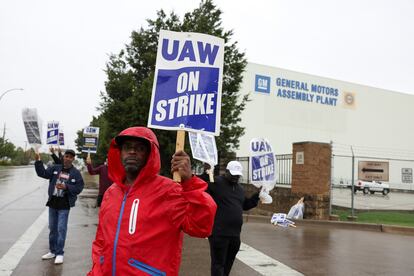General Motors, Ford and Stellantis lose $22 billion in stock market value due to strike
The new agreements with UAW, which include wage hikes and other concessions, will increase their labor costs and make a dent in their profits


The automobile strike in the United States has left a large bill for Detroit’s Big Three due to lower production and sales. The third quarter earnings report released by General Motors (GM) and Ford last week show as much, while Stellantis is expected to share its results this week. In addition, companies have been battered on the stock market: in six weeks of strike, they have lost around $22 billion in share value.
Ford and Stellantis reached agreements with union negotiators last week that involve strong wage increases and other labor concessions that will affect the companies’ cost structures. Negotiations with GM also seemed on track, but they went off course at the last minute, and the United Auto Workers (UAW) union decided on Saturday to expand the strike to a new factory to increase pressure. The 4,000 workers at the Spring Hill (Tennessee) plant, which assembles Cadillac SUV models and manufactures engines used to assemble cars in other plants owned by the group, have joined the strike.
GM has offered to match the minimum 25% increase in four and a half years that workers at Ford and Stellantis have achieved, but the negotiation stalled on other issues. In the two other agreements, the pay increase is accompanied by cost-of-living rises, the end of some wage tiers, guarantees of job security and other concessions with which workers will be compensated for the sacrifices they made during the 2007-2008 financial crisis to save the companies, whose existence was threatened at the time. In recent years, all three had been experiencing record sales and profits.
Ford and GM had felt the impact on the stock market most keenly, with drops of around 20%, while Stellantis, which is less dependent on the U.S. market, saw share value drop by just 4% in the six weeks of conflict. The direct cost of the strike will not weigh as heavily on the companies’ accounts as the change in cost structures and the loss of profitability that the new agreements represent, comes at a time when the transition to electric cars also requires heavy investments.
Since September 14, the day before the start of the strike, Ford shares have suffered a 21% drop on the stock market, from $12.62 per share to $9.96. This has led to a $10.6 billion loss in market capitalization, to the $39.9 billion that the company is now worth. Ford announced on Thursday that it was withdrawing its profit forecast for the whole year to evaluate the impact on its accounts of the strike and the new collective agreement agreed with the UAW.
GM has acknowledged that the strike has already left it with an accumulated bill of $800 million and estimated the cost of the conflict at $200 million per week if the stoppage continued. The company’s shares have fallen 19% on the stock market during the strike period, from $33.66 to $27.22, leading to an $8.8 billion loss in market capitalization, which was $37.3 billion at the close of the trading day on Friday. The company also announced a slowdown in its investments in electric cars. “We are also moderating the acceleration of EV production in North America to protect our pricing, adjust to slower near-term growth in demand, and implement engineering efficiency and other improvements that will make our vehicles less expensive to produce, and more profitable,” said CEO Mary Barra in a letter to shareholders.
Stellantis, meanwhile, has better resisted the pressure on the stock market. The company, which is the result of the merger of Fiat Chrysler and PSA, brings together not only the American brands Chrysler, Dodge and Jeep, but also European brands that carry great weight within the group such as Fiat, Peugeot, Citroën, Opel, Alfa Romeo, Lancia and Maserati. Its shares, which are listed on various markets, have fallen by just over 4% during the strike, which has meant a drop in market capitalization of about $2.6 billion.
The three companies together have a market capitalization of about $140 billion, half that of Japan’s Toyota and far from Tesla, the sector leader by stock market value. The company led by Elon Musk has a market capitalization of about $650 billion.
Sign up for our weekly newsletter to get more English-language news coverage from EL PAÍS USA Edition
Tu suscripción se está usando en otro dispositivo
¿Quieres añadir otro usuario a tu suscripción?
Si continúas leyendo en este dispositivo, no se podrá leer en el otro.
FlechaTu suscripción se está usando en otro dispositivo y solo puedes acceder a EL PAÍS desde un dispositivo a la vez.
Si quieres compartir tu cuenta, cambia tu suscripción a la modalidad Premium, así podrás añadir otro usuario. Cada uno accederá con su propia cuenta de email, lo que os permitirá personalizar vuestra experiencia en EL PAÍS.
¿Tienes una suscripción de empresa? Accede aquí para contratar más cuentas.
En el caso de no saber quién está usando tu cuenta, te recomendamos cambiar tu contraseña aquí.
Si decides continuar compartiendo tu cuenta, este mensaje se mostrará en tu dispositivo y en el de la otra persona que está usando tu cuenta de forma indefinida, afectando a tu experiencia de lectura. Puedes consultar aquí los términos y condiciones de la suscripción digital.








































